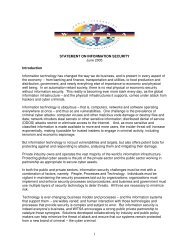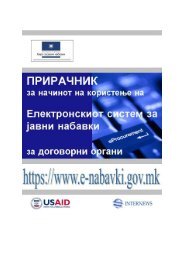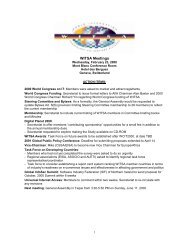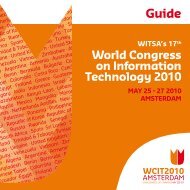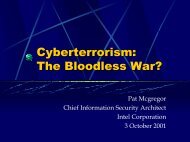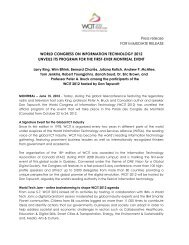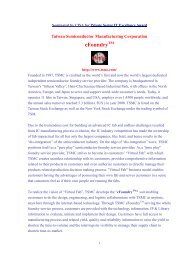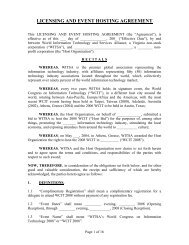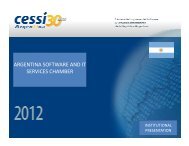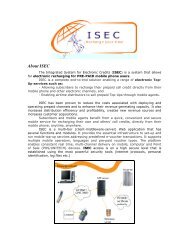Digital Planet - Executive Summary v1 - WITSA
Digital Planet - Executive Summary v1 - WITSA
Digital Planet - Executive Summary v1 - WITSA
- No tags were found...
You also want an ePaper? Increase the reach of your titles
YUMPU automatically turns print PDFs into web optimized ePapers that Google loves.
implications of this study’s findings should be very clear topolicy makers, managers, and planners:• Invest. ICT investment is highly correlated with economicgrowth, higher education, new company starts,personal productivity, and job creation. Spending onICT will improve a company’s and a country’s abilityto compete in the global market.• Invest now. Nearly every country worldwide is committedto increased spending on ICT. Laggards will beleft behind.• Connect. Networked PCs and online individuals formthe basis for participation in the new economy. Companiesshould maximize their investments in technologyby connecting users to a common ICTinfrastructure and the Internet.• Connect now. Leading countries are accelerating theirinvestments in Internet and communications technologies.Countries that do not continue to match thisrapid pace of investment will rapidly fall behind.• Deregulate. Telecommunications authorities shouldmake the deregulation of local network access andinterconnection a high priority. Competition will allowfor less-expensive access to the global communicationsnetwork, which enables a greater number of individualsto connect and rapidly decreases investment paybacktimes.• Deregulate now. Over-regulation costs jobs andreduces productivity. Unfortunately, the benefits ofderegulation take time. Countries that continue toretain control of ICT competition will encounteradverse effects to their future economies.<strong>Summary</strong> of Project ScopeThis study was commissioned to answer the need for highqualitydata on the global implications of the ICT industry.The <strong>Digital</strong> <strong>Planet</strong> — The Global Information Economystudy conducted by IDC for <strong>WITSA</strong> presents the broadestview of current levels of customer spending on informationtechnology and communications ever assembled.The data were obtained through a variety of means. Theprincipal source was an in-depth vendor supply analysis ofdata collected in all 50 countries via surveys and interviewsdesigned specifically for this project. This analysis alsoincluded review of financial records of major ICT companieslocated throughout the world. These data were thencompared to findings from surveys of IT professionals, endusers, and channel partners performed by telephone andpersonal interviews. Finally, official statistics on GDP, telephoneusage, and jobs were collected from other organizationssuch as the World Bank, InternationalTelecommunications Union (ITU), and Organization ofEconomic Co-operation and Development(OECD). Oncecollected, IDC’s team of analysts synthesized this broadrange of data with their extensive knowledge of the marketplaceto perform an integrated examination of the globalICT market.The broadly used definition of “information technology”(IT) includes analyses of spending by businesses, homes,government, and education on IT hardware (personal computers,servers, networking equipment), software, and ITservices (systems implementation, training, IT consulting,etc.). The European Information Technology Observatory(EITO) and other organizations have added telecommunications(services and hardware) and office equipment totheir definition of ICT.Keeping the EITO definition as a base, <strong>WITSA</strong> added onemore spending category — internal spending. Throughresearch provided by IDC’s Global IT Survey, spending bycompanies on internal resources (i.e., IT employee salaries,capital depreciation of IT equipment, and the internal portionof the IS spending budgets) is quantified and added tothe overall size of the market.For the purposes of this study, ICT is the sum of externaland internal IT spending, plus telecommunications andother office equipment. The social impact of ICT is measuredby looking at the number of personal computers(PCs) networked, the installed base of PCs in homes andschools, percentage of homes with telecommunicationsaccess, and the number of Internet hosts in each country.Finally, an industry of this magnitude has an impact onGDP, new businesses, and employment. This study containscountry-to-country comparisons of the investment ofICT, effects of ICT growth on GDP growth, the numberof industry-related businesses, and the number of peopleemployed by these companies.Page 6<strong>Digital</strong> <strong>Planet</strong> — The Global Information Economy


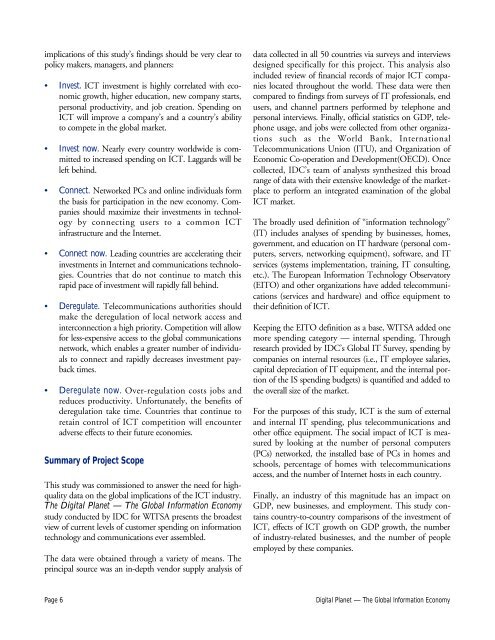
![witsa-[association member] ict excellence awards program](https://img.yumpu.com/51340170/1/190x245/witsa-association-member-ict-excellence-awards-program.jpg?quality=85)
